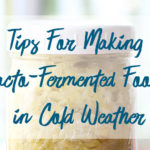Are these common misconceptions about fermented foods stopping you from making your first batch? Or you’ve made your first batch but are afraid to try it, because of these?
Watch my new video, “Common Misconceptions About Making Fermented Foods” if you want to get over your fear and start making your first batch of sauerkraut or pickles.
Get on the waiting list for my new online course, Fermenting Veggies here.
#1 You’re afraid of making yourself sick
Are you afraid to ferment foods because you think you’ll make yourself or family sick? Well, you’re not alone. I was afraid to eat fermented foods at first too. Leaving food out on the counter for days and then eating it was counterintuitive.
I was taught to keep food in the refrigerator or it would make you sick. So, I had to re-train my brain that it was okay to eat fermented foods.
One way I got over being afraid to take that first bite (after throwing away many batches of kraut because I was afraid to eat it), was learning about the process. It’s soooo safe.
Lacto-fermentation is the oldest form of food preservation in the world. Lacto stands for lactobacillus bacteria. Which act as a preservative in your ferments and give it that classic tangy flavor. Lacto-fermentation involves only salt, water and vegetables.
The salt water brine creates an environment free of oxygen (anaerobic) where only lactobacillus bacteria can survive. Harmful bacteria can’t survive in this salty environment.
It helped me to get over the fear of making myself sick when I understood the stages of fermentation a little more. Once I knew this, I wasn’t afraid to try the sauerkraut I had sitting on my counter.
The article, “Lacto-fermentation – How It Works” written by Food Preservation Expert, Leda Meredith explains the stages as…
In stage one of lacto-fermentation, vegetables are submerged in a brine that is salty enough to kill off harmful bacteria. The Lactobacillus good guys survive this stage and begin stage two.
In stage two of lacto-fermentation, the Lactobacillus organisms begin converting lactose and other sugars present in the food into lactic acid. This creates an acidic environment that safely preserves the vegetables – and gives lacto-fermented foods their classic tangy flavor.
Generally, as long as you use salt and keep your veggies under the brine, you’re safe.
The result is a food that is loaded with probiotics and flavor. Eating probiotic foods like this strengthens your immune system, increases vitamin and mineral absorption and helps balance hormones.
#2 It’s hard or complicated or you need special tools
You may have heard that you need special tools to make fermented foods or that it’s really complicated. I’m telling you that’s totally wrong.
The one thing that I hear over and over again after someone has made any kind of sauerkraut or pickles, is that they can’t believe how easy it was.
Seriously, all you need is a recipe, vegetables (or cabbage if you’re going to make sauerkraut), a knife, a cutting board, salt and a glass jar to ferment it in. If you don’t have a mason jar, you can use an old pickle jar or mayonnaise jar.
You don’t have to buy anything fancy to make your first batch of fermented foods.
#3 You need a culture starter
Another misconception people have is that you need a culture-starter. A culture starter adds probiotic bacteria to get fermentation started. You don’t need a culture starter because vegetables have the probiotic bacteria naturally occurring on their skin.
I prefer the taste of fermented veggies without using culture starter and I think letting the process of fermentation happen naturally may be more beneficial.
As you can see, making fermented foods will NOT make you sick, you can make them using tools around your kitchen and you don’t need any fancy starters either.
If you’re new to making fermented foods or made fermented foods before but didn’t like the results, you should join my new online course, Fermenting Veggies.
The new course will cover everything you need to know to make Fermented Foods at home. It will cover safe fermentation, how to make pickles, sauerkraut, fermented sauces, troubleshooting and much more.
Learn more about the course and sign up for the waiting list here.





